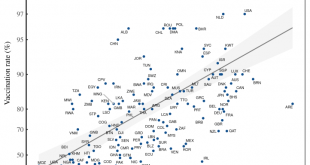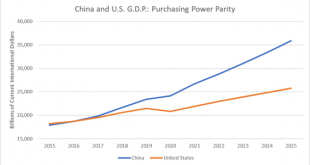Read More »
Mainstream economics finally made it …
from Lars Syll Wooh! So this is reality!
Read More »As 2020 ends, let’s celebrate science
from Blair Fix We’ve finally reached the end of 2020, a year that many people are happy to forget. In the history books, 2020 will be known for little besides the Covid pandemic. Fortunately, the end of this disaster is in sight. With multiple vaccines starting to roll out, it looks like 2021 will be a better year. Speaking of vaccines, I’ve been racking my brain to find things to be thankful for this holiday season. It’s not easy. My wife, daughter and I are in lockdown in Toronto. The...
Read More »End of the year thoughts on inequality and its remedies
from Dean Baker The approach of the end of the year seems a good time to sum up thoughts. My comments here will not be news to regular readers, but may be to others. Also, this exercise is helpful for me to keep my thoughts clear. (I also expect to take next week off, so you won’t be hearing from me for a while.) Most of my work for the last several years has been focused on ways to reduce before tax inequality by reducing the amount of before-tax income that goes to those at the top of...
Read More »On logic and science
from Lars Syll Suppose you conducted an observational study to identify the effect of heart transplant A on death Y and that you assumed no unmeasured confounding given disease severity L. A critic of your study says “the inferences from this observational study may be incorrect because of potential confounding.” The critic is not making a scientific statement, but a logical one. Since the findings from any observational study may be confounded, it is obviously true that those of your...
Read More »? One House Worship BTS | Interview with Eliot Dean Baker
@EliotDeanBaker is taking us behind the scenes of the writing & video process for “He Always Provides” Experience the new anthem by @OneHouseWorship x @ChandlerDMoore on YouTube NOW! Stay Connected: YouTube: https://bit.ly/3cfuAQB Instagram: https://bit.ly/337SP0a Facebook: https://bit.ly/3pJOpGm Twitter: https://bit.ly/37cKdGX Stream music on all platforms: ONE HOUSE WORSHIP on Spotify: https://spoti.fi/3pNCQhn ONE HOUSE WORSHIP on Apple Music:...
Read More »Climate Change and the Social Contract
Marcellus Andrews I am sorry to say that I am about to confirm my marginal status in the economics profession by digging into a most unpleasant aspect of the already far too scary matter of climate change. I am going to consider why climate change will inevitably shred the contemporary American social contract – that evolving mix of markets and violence that creates knowledge and wealth, billionaires and prisoners, opportunity and social death in ways that fascinate and horrify the rest...
Read More »Debt, levered losses, & unemployment
from Asad Zaman A previous post on “Causes of the Global Financial Crisis” provided a detailed summary of the first three chapters of “House of Debt” by Mian and Sufi. This post provides a brief summary of Chapters 4 and 5, in which they present a theoretical framework which explains why leveraged debt leads to high unemployment following a shock to asset prices. The main insight is that the problem is caused by interest-based debt contracts which put most of the risks of default on the...
Read More »Little value from Global Chains
from C. P. Chandrasekhar On December 12, in an outburst of suppressed anger, workers employed at a factory assembling iPhones in Narasapura near Bengaluru ransacked its premises and damaged parked vehicles. The facility is a unit of Wistron, a Taiwanese vendor engaged in assembly of Apple iPhones, that had begun commercial operations only recently. This made the worker action surprising to say the least. Workers recently employed in a known foreign-invested firm are not likely to turn...
Read More »China has the world’s largest economy: Get over it
from Dean Baker It is more than a bit annoying to hear reporters endlessly refer to China as the world’s second largest economy. It isn’t. It’s the world’s largest economy and has been since 2017. Here are the data from the International Monetary Fund. Source: International Monetary Fund. As the chart shows, China’s economy first passed the U.S. in 2017. It is projected to be more than 16 percent larger this year, and by 2025 is projected to be almost 40 percent larger by 2025....
Read More » Real-World Economics Review
Real-World Economics Review






